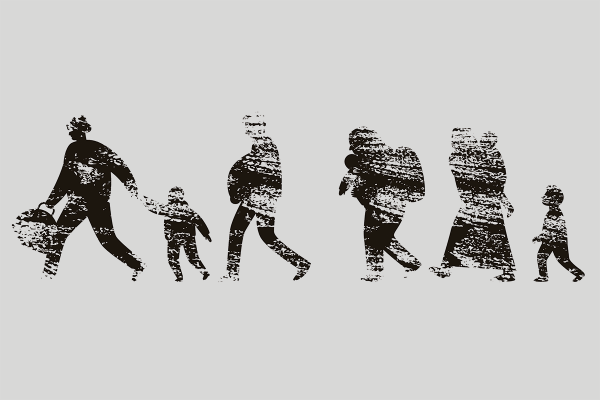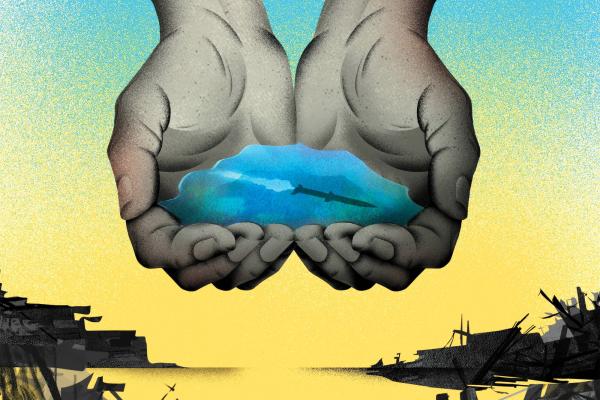I KNEW ALMOST immediately it was bad news.
“Maria was separated at the border from her auntie,” my friend said in a phone call. “We don’t know where she is. Her auntie was sent back to Mexico and we think is being held by a drug cartel. They separated them under Title 42.”
I felt sick. Four-year-old Maria (not her real name) and her aunt were fleeing violent circumstances. They arrived at the U.S.-Mexico border to exercise their legal right — protected by both international and U.S. law — to request asylum, as other members of Maria’s family had done prior to the COVID-19 pandemic.
In March 2020, everything changed. The Trump administration, through the Centers for Disease Control and Prevention (CDC), invoked a rarely used subsection of public health code called Title 42 to close U.S. borders to asylum seekers and unaccompanied children under the guise of preventing the spread of COVID-19. It made that decision against the advice of many public health experts, including some within the CDC, who agreed there was no public health rationale for a ban on asylum seekers as a group. Though the border remained open to truckers, temporary workers, students, and others, border agents turned back asylum seekers to Mexico or their home country.
Eight months later, Joe Biden was elected president. Despite campaigning on immigration reform, the Biden administration not only maintained but expanded the use of Title 42. The number of expulsions skyrocketed. Since 2020, the Title 42 health code has been used 2.1 million times to deny migrants the right to seek asylum.
The use of Title 42 and other discriminatory policies is especially devastating for Black migrants. In September 2021, many were horrified to see videos of Haitian migrants assaulted by horseback Border Patrol agents wielding reins as whips as the migrants carried food and water to their families at an encampment in Del Rio, Texas. Guerline Jozef, co-founder of Haitian Bridge Alliance, said, “Black asylum seekers need compassion, not an endless cycle of inhumane and careless treatment.”
I grew up in a Christian community that believed the gospel’s core message is to love one another (John 13:34) and that we show our love by welcoming people — regardless of their background, status, or documentation. Jesus says, “I was a stranger and you welcomed me” (Matthew 25:35) — but, instead of welcome, Title 42 and related policies push thousands of families back into life-threatening conditions.
In Mexico, shelters are full. Dangerous outdoor encampments have developed at points of entry at the border. Between January 2021 and June 2022, Human Rights First tracked 10,318 reports of murder, kidnapping, rape, torture, and other violent attacks against people blocked in or expelled to Mexico under Title 42. U.S. and international law provide a clear right for people fleeing persecution to seek asylum in person at a U.S. border, where they then must prove their case of “credible fear.”
I have been honored to stand with asylum seekers, faith communities, and immigrant rights advocates who have turned moral outrage into prophetic action to end Title 42 and other anti-asylum policies. And we are making progress.
After months of sustained public pressure, the Biden administration announced in April 2022 its plans to end the use of Title 42. The blowback from proponents was swift. Senate Republicans proposed a bill to codify the Title 42 expulsion order until 2025. But asylum seekers on both sides of the border joined thousands of advocates across the United States to push back on that attempt. By August, organizing efforts had successfully blocked that legislation.
In November, U.S. District Judge Emmet Sullivan ruled against Title 42, saying the order was an “arbitrary and capricious” violation of federal law. Sullivan wrote that when Title 42 was initiated, the Trump administration knew the order “would likely expel migrants to locations with a ‘high probability’ of ‘persecution, torture, violent assaults, or rape.’” The court ordered expulsions under Title 42 to stop by the end of December. While countermeasures will attempt to keep Title 42 in place, we have witnessed the power of advocates to effectively hold our government accountable.
After the phone call about Maria and her aunt, advocates located Maria at a detention facility in Texas. She was eventually reunited with her mother and siblings. Maria’s aunt never made it to the U.S.
The legacy of how a public health code, such as Title 42, was misused demands our vigilance about future legislation that endangers asylum seekers and undermines human rights. We can each call on our members of Congress to pass legislation that would restore processing of asylum seekers at the border and create a just and legal asylum system that honors their humanity. Our political representatives must stand against any measures that block people from seeking aslyum.
As Christians, we are called to see the image of God in every person. How many more asylum seekers will we allow to be treated inhumanely before we change our policies to reflect our values?

Got something to say about what you're reading? We value your feedback!





